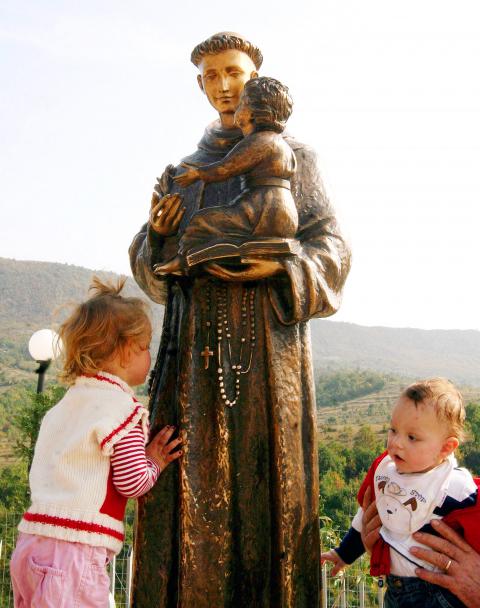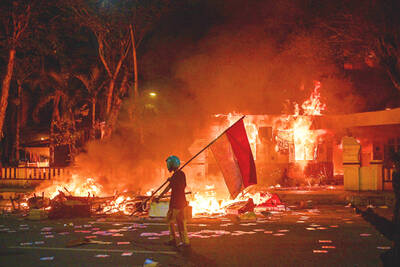On an Albanian spring day, dozens of Muslims, Catholics and Orthodox Christians toil together up a steep, winding slope to St Anthony’s Church — different faiths all hoping for a miracle.
Some of the pilgrims heading up the stony path to the imposing church are barefoot and wedge their feet into cracks in rocks believed to have powers, including protection against disease.
Others collect five white stones along the way and, in accordance with tradition, whisper to each before placing it back on the ground.

Photo: AFP
Ilir, a young Orthodox Christian engineer, rubs his wallet on a rock, hoping for prosperity. “I have come to pray to God for my prayers to be granted this year,” he says.
Catholic mother-of-two Mir is praying St Antony will save her marriage.
“I have problems with my husband,” the young lawyer says.
“I come to ask God to give me a son this year,” says Servete, a Muslim who has traveled to Lac, about 50km north of the capital Tirana, from Durres further west.
On their slow march up the hill, the pilgrims pass a cave where legend says St Antony slept; some leave clothing belonging to their children or sick loved ones needing a cure.
The popular weekly pilgrimage is testament to the survival in Albania of a strong religious faith despite efforts of the 1945 to 1990 communist dictatorship to mercilessly root it out.
Repression and international isolation under the militantly atheistic regime, which banned all forms of religious expression, has today forged an original mix of faith, superstition, folklore and tolerance.
The majority of Albania’s population of almost 3 million is Muslim, but there are strong Orthodox and Catholic minorities too.
The different faiths tend to worship at the same places and people sometimes switch religions for convenience, which might shock some in less tolerant societies.
Here, God is the “same for the Catholics, the Orthodox and the Muslims,” anthropologist Aferdita Onuzi says. “All believe in a miracle that could change their life.”
With the communist dictatorship banning all religious practices in the country, sociologist Artan Fuga says: “Believers who could not practice their faith freely went to look for the divine where they could find it ... also using sacred places or objects from animist and pagan beliefs.”
In an example, thousands of Albanians of all faiths come together each August on Tomorri mountain in the south of the country to honor both a pagan sun cult and the religious practices of an Islamic Sufi order, the Bektashi.
“Common attendance by Muslims and Christians to the places of worship is a widespread phenomenon in Albania,” says Besnik Mustafaj of the non-governmental Forum of Alliance of Civilizations.
Many Albanians “during their eventful history, switched from one religion to another, because of economic necessities or more simply for practical questions,” says Lira Caushi, professor at Tirana’s university.
Albania was Christian when it was conquered by the Ottoman Empire in the 15th century and many of its people converted to Islam in order to get jobs in the Ottoman administration.
In an example that persists today, Albanians who want to emigrate to neighboring Greece, an EU member, try to change their identity to prove they belong to Albania’s Greek minority and in the process convert to Orthodox Christianity.
Marriages between Muslims and Christians are frequent and many Albanians are at loss to say which religion they practice.

Australia has announced an agreement with the tiny Pacific nation Nauru enabling it to send hundreds of immigrants to the barren island. The deal affects more than 220 immigrants in Australia, including some convicted of serious crimes. Australian Minister of Home Affairs Tony Burke signed the memorandum of understanding on a visit to Nauru, the government said in a statement on Friday. “It contains undertakings for the proper treatment and long-term residence of people who have no legal right to stay in Australia, to be received in Nauru,” it said. “Australia will provide funding to underpin this arrangement and support Nauru’s long-term economic

‘NEO-NAZIS’: A minister described the rally as ‘spreading hate’ and ‘dividing our communities,’ adding that it had been organized and promoted by far-right groups Thousands of Australians joined anti-immigration rallies across the country yesterday that the center-left government condemned, saying they sought to spread hate and were linked to neo-Nazis. “March for Australia” rallies against immigration were held in Sydney, and other state capitals and regional centers, according to the group’s Web site. “Mass migration has torn at the bonds that held our communities together,” the Web site said. The group posted on X on Saturday that the rallies aimed to do “what the mainstream politicians never have the courage to do: demand an end to mass immigration.” The group also said it was concerned about culture,

ANGER: Unrest worsened after a taxi driver was killed by a police vehicle on Thursday, as protesters set alight government buildings across the nation Protests worsened overnight across major cities of Indonesia, far beyond the capital, Jakarta, as demonstrators defied Indonesian President Prabowo Subianto’s call for calm. The most serious unrest was seen in the eastern city of Makassar, while protests also unfolded in Bandung, Surabaya, Solo and Yogyakarta. By yesterday morning, crowds had dispersed in Jakarta. Troops patrolled the streets with tactical vehicles and helped civilians clear trash, although smoke was still rising in various protest sites. Three people died and five were injured in Makassar when protesters set fire to the regional parliament building during a plenary session on Friday evening, according to

CRACKDOWN: The Indonesian president vowed to clamp down on ‘treason and terrorism,’ while acceding to some protest demands to revoke lawmaker benefits Protests in Indonesia over rising living costs and inequality intensified overnight, prompting Indonesian President Prabowo Subianto to cancel a planned trip to China, while demonstrators reportedly targeted the homes of the finance minister and several lawmakers. Rioters entered Indonesian Minister of Finance Sri Mulyani Indrawati’s residence near Jakarta early yesterday, but were repelled by armed forces personnel, Kompas reported. Items were taken from the homes of lawmaker Ahmad Sahroni and two others, according to Detik.com. The reports of looting could not be independently verified, and the finance ministry has not responded to requests for comment. The protests were sparked by outrage over